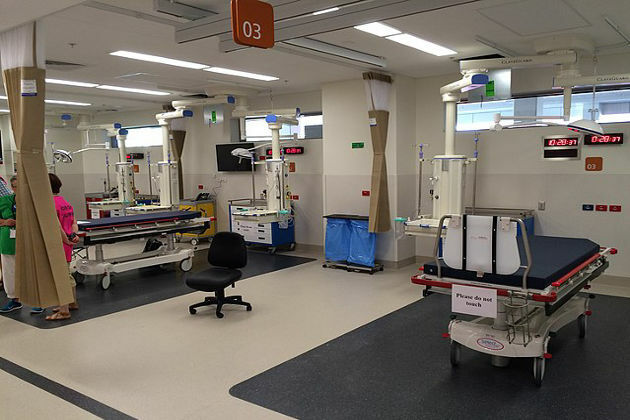Peak Asia Pacific fertility body endorses reform blueprint to create more family friendly societies
PR Newswire
18 Sep 2023, 06:56 GMT+10
 |
ADELAIDE, Australia, Sept. 18, 2023 /PRNewswire/ -- A unique reform blueprint to advance family friendly policies and arrest falling birth rates will be championed across the Asia Pacific by the peak body representing scientists, doctors, nurses and counsellors in assisted reproduction in the region.
The Asia Pacific Initiative on Reproduction (ASPIRE) will advocate policy interventions that can be considered in different legislatures based on the state of socio-economic development in each country.
ASPIRE works in more than 20 countries to improve knowledge of infertility, which affects one in six couples globally, and to promote awareness of infertility-related services with the ultimate aim of improving the quality of patient care.
Infertility is defined as the failure to conceive after a year of unprotected intercourse or the inability to carry pregnancy to a live birth. The causes of infertility are equally shared among male and female partners.
ASPIRE President, Dr Clare Boothroyd, said a primary objective of the organisation was to support the basic reproductive rights of all individuals and couples to decide freely and responsibly how many children to have and when to have them.
However, moves towards more confined urban environments, growing demands on women in the workforce and lifestyle pressures impacting on the reproductive potential of individuals and couples have seen birth rates in many APAC countries in serious decline with major socio-economic consequences.
Dr Boothroyd said ASPIRE has endorsed the Fertility Counts initiative outlined at its recent 2023 Congress in Adelaide, South Australia, which attracted more than 1,400 delegates in assisted reproduction from the Asia Pacific and beyond.
A key element of the initiative is an innovative toolkit using global evidence-based data and resources to guide policy decisions in key categories including childcare, workplace reform, financial incentives for parenthood and improved access to infertility treatment.
The Fertility Policy Toolkit was designed by Economist Impact, a global forum that helps advance sustainable strategies to guide governments and corporate leaders, following analysis of complex total fertility rate challenges around the world.
It builds on socio-economic and birth rate research conducted in countries and regions including Australia, Indonesia, Japan, Malaysia, the Republic of Korea, Singapore, Taiwan, Thailand and Vietnam.
Dr Boothroyd said ASPIRE has formed a working party to promote key aspects of the Fertility Counts program based on local insights and engagement with policy decision makers in each setting.
"We will also be liaising with relevant medical and scientific societies in various countries to advance the objectives to build more family friendly societies that support couples in their decisions about parenthood," she added.
"This has been one of the most exciting outcomes from the ASPIRE Congress in Adelaide. Gaps in access to quality fertility care exist in all health settings, but they are particularly present in some countries in the Asia Pacific region.
"The causes are complex and diverse, but can include economic limitations, lack of suitable infrastructure, restricted social resources, legislative and cultural issues."
Emily Tiemann, lead author of the Fertility Policy Toolkit, said key policies supporting people wanting to have children relate to childcare and parental leave, early awareness and education around falling fertility, access to fertility treatment and support to reintegrate into the workforce.
"The birth rates of many APAC countries have dramatically declined," she said. "Across the region, the average number of children born per woman has dropped threefold since 1960, from 5.4 in 1960 to 1.8 in 2020, with some countries seeing even steeper drops.
"We describe specific policy initiatives that are given a score based on trusted case studies and their impact on fertility rates along with separate indicators demonstrating expected economic outcomes of each policy.
"The toolkit presents various policies in a user-friendly way, providing a menu of options that APAC countries can explore. Intended beneficiaries of the toolkit are those with the ability to influence, develop and implement policies and programs to improve fertility rates in the APAC region."
 Share
Share
 Tweet
Tweet
 Share
Share
 Flip
Flip
 Email
Email
Watch latest videos
Subscribe and Follow
Get a daily dose of Sydney Sun news through our daily email, its complimentary and keeps you fully up to date with world and business news as well.
News RELEASES
Publish news of your business, community or sports group, personnel appointments, major event and more by submitting a news release to Sydney Sun.
More InformationBusiness
SectionBeijing hits back at EU with medical device import curbs
HONG KONG: China has fired back at the European Union in an escalating trade dispute by imposing new restrictions on medical device...
Wall Street reels after Trump invokes new tariffs
NEW YORK, New York - Monday's trading session saw mixed performances across U.S. and global markets, with several major indices posting...
Trump admin allows GE to restart engine sales to China’s COMAC
WASHINGTON, D.C.: The U.S. government has granted GE Aerospace permission to resume jet engine shipments to China's COMAC, a person...
Saudi Aramco plans asset sales to raise billions, say sources
DUBAI, U.A.E.: Saudi Aramco is exploring asset sales as part of a broader push to unlock capital, with gas-fired power plants among...
Russia among 4 systemic risk countries for Italian banks
MILAN, Italy: Italian regulators have flagged four non-EU countries—including Russia—as carrying systemic financial risk for domestic...
US debt limit raised, but spending bill fuels fiscal concerns
NEW YORK CITY, New York: With just weeks to spare before a potential government default, U.S. lawmakers passed a sweeping tax and spending...
International
SectionTrump defends use of 'Shylock,' citing ignorance of slur
WASHINGTON, D.C.: President Donald Trump claimed he was unaware that the term shylock is regarded as antisemitic when he used it in...
Summer travel in chaos as French air traffic controllers walk off job
PARIS, France: A strike by French air traffic controllers demanding improved working conditions caused significant disruptions during...
Congress weighs Medicaid cuts, sparking alarm in small-town hospitals
OMAHA, Nebraska: With Congress considering cuts totaling around US$1 trillion to Medicaid over the next decade, concerns are rising...
Gas station blast injures 40 in Rome, kids narrowly escape
ROME, Italy: Quick thinking by emergency responders helped prevent greater devastation after a gas station explosion in southeastern...
Weapons pause by Trump signals shift away from foreign wars
WASHINGTON, D.C.: President Donald Trump is drawing praise from his core supporters after halting key arms shipments to Ukraine, a...
Moscow removes Taliban from banned list, grants official status
MOSCOW, Russia: This week, Russia became the first country to officially recognize the Taliban as the government of Afghanistan since...













